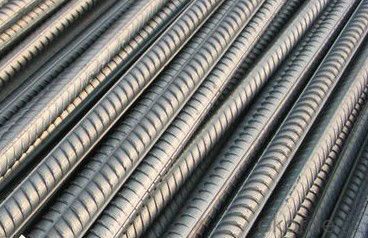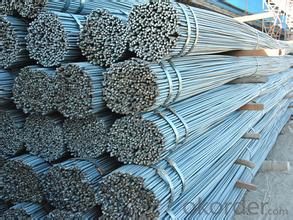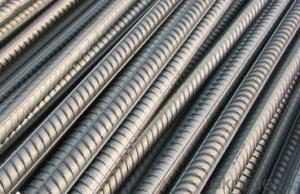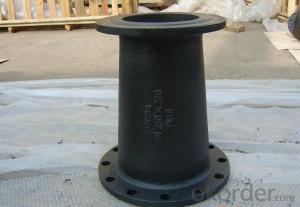High Tensile Steel Rebar ASTM BS4449 Rebar Steel
- Loading Port:
- Tianjin
- Payment Terms:
- TT or LC
- Min Order Qty:
- 100 m.t.
- Supply Capability:
- 5000 m.t./month
OKorder Service Pledge
OKorder Financial Service
You Might Also Like
High Tensile Steel Rebar ASTM BS4449 Rebar Steel
Structure of High Tensile Steel Rebar:
Type | Deformed steel bar/ TMT bars | MOQ | 500 MT (Trial order accepted) |
Standard Grade | GB1499.2-2007, HRB335, HRB400, HRB500. BS4449/2005, B500A, B500B etc.. ASTM A615 Gr.40, Gr60, KS, SD400, SD500 and so on.. | ||
Technique | Hot rolled continuous casting | Length | 6, 9,12m, or as requested |
Size | 6mm-32mm | Payment terms | T/T, L/C at sight, Usance L/C |
Packing | In bundle | Inspection | Third party inspection accepted |
Trade terms | EXW, FOB, CFR, CIF | Trans terms | FIO, FILO, FLT |
Delivery time | 15-30 days, according to the quantity | Note | Customized service is available (for sizes,length and chemical components etc.). |
Main Features of High Tensil Steel Rebar:
HRB335 | Chemical composition | C | Mn | Si | S | P |
0.17-0.25 | 1.0-1.6 | 0.4-0.8 | 0.045 Max. | 0.045 Max. | ||
Mechanical Property | Yield strength | Tensile strength | Elongation | |||
≥335 Mpa | ≥455 Mpa | 17% | ||||
HRB400 | Chemical composition | C | Mn | Si | S | P |
0.17-0.25 | 1.2-1.6 | 0.2-0.8 | 0.045 Max. | 0.045 Max. | ||
Mechanical Property | Yield strength | Tensile strength | Elongation | |||
≥400 Mpa | ≥540 Mpa | 16% | ||||
HRB500 | Chemical composition | C | Mn | Si | S | P |
0.25 Max. | 1.6 Max. | 0.8 Max. | 0.045 Max. | 0.045 Max. | ||
Mechanical Property | Yield strength | Tensile strength | Elongation | |||
≥500 Mpa | ≥630 Mpa | 15% | ||||
Specifications and Datas:
Deformed steel bar | ||||
Diameter (mm) | Theoretical weight (kg/m) | Pieces/Mt (pcs) | Length (m) | Standard |
6 | 0.222 | 375 | 12 | GB1499-48, HRB335, HRB400, HRB500 BS4449-97, Gr.460B,B500
|
8 | 0.395 | 211 | ||
10 | 0.617 | 135 | ||
12 | 0.888 | 94 | ||
14 | 1.21 | 69 | ||
16 | 1.58 | 53 | ||
18 | 2 | 42 | ||
20 | 2.47 | 34 | ||
22 | 2.98 | 28 | ||
25 | 3.85 | 22 | ||
28 | 4.83 | 17 | ||
32 | 6.31 | 13 | ||
36 | 7.99 | 10 | ||
40 | 9.87 | 8 | ||
50 | 15.42 | 5 | ||
FAQ:
Why choose us:
1. More than 10 years experience in this industry
2. 100,000 tons exporting per month
3. Professional foreign trade team
4. OEM&ODM capacity
5. High quality assured & competitive price
6. Try our best to meet your needs & save your budget
7. Very popular in Southeast Asia, Africa, Mid-East and South America etc.
8. VIP membership system, first time customers and long-term cooperation customers can get extra discount on some products.
Pictures:


- Q:Can ductile iron pipes be used in areas with high levels of organic matter in soil?
- Yes, ductile iron pipes can be used in areas with high levels of organic matter in soil. Ductile iron pipes have excellent corrosion resistance, making them suitable for various soil conditions, including those with high levels of organic matter. They are resistant to chemical attacks and offer long-term durability, making them a reliable choice for such environments.
- Q:How do ductile iron pipes handle seismic movements?
- Ductile iron pipes are renowned for their exceptional capacity to handle seismic movements, owing to their distinctive properties and construction. This renders them remarkably resistant to stress and deformation caused by ground vibrations during earthquakes. One of the primary merits of ductile iron pipes lies in their superior tensile strength, enabling them to endure substantial forces without succumbing to breakage or rupture. When seismic movements occur, these pipes exhibit flexibility and absorb the energy generated by the ground vibrations, thereby minimizing the risk of damage or failure. Moreover, ductile iron pipes possess exemplary resilience, allowing them to revert to their original shape after being subjected to external forces. This characteristic empowers the pipes to adapt to ground movements during earthquakes, effectively diminishing the likelihood of fractures or leaks. Furthermore, ductile iron pipes boast considerable ductility, enabling them to deform without fracturing. This attribute proves crucial during seismic events, as it enables the pipes to absorb the energy generated by ground vibrations by deforming and subsequently returning to their original shape once the seismic activity subsides. In order to further enhance their capacity to handle seismic movements, ductile iron pipes are frequently designed and installed with flexible joints. These joints grant the pipes the ability to move and adjust to ground movements, offering additional safeguards against damage or failure. In conclusion, ductile iron pipes have demonstrated their extraordinary reliability and resilience in withstanding seismic movements. Their combination of high tensile strength, resilience, and ductility make them an optimal choice for regions prone to earthquakes, ensuring the safety and durability of fluid transportation systems.
- Q:What is the expected roughness coefficient of ductile iron pipes?
- The expected roughness coefficient of ductile iron pipes is typically between 0.01 to 0.015.
- Q:Can ductile iron pipes be used for gas distribution networks?
- Yes, ductile iron pipes can be used for gas distribution networks. Ductile iron pipes are known for their strength, durability, and resistance to corrosion, making them a suitable choice for various applications, including gas distribution. These pipes can withstand high-pressure environments and are less likely to crack or break under stress. Additionally, ductile iron pipes have a long lifespan, reducing the need for frequent replacements and maintenance. However, it is important to note that specific regulations and standards must be followed when installing ductile iron pipes for gas distribution, ensuring proper safety measures and compliance with industry guidelines.
- Q:Can ductile iron pipes be recycled?
- Yes, ductile iron pipes can be recycled. Ductile iron is a highly recyclable material, and the pipes can be melted down and reused in various applications, reducing the need for raw materials and promoting a more sustainable approach to infrastructure development.
- Q:Are ductile iron pipes resistant to frost heave?
- Ductile iron pipes are generally considered to be resistant to frost heave. Frost heave occurs when water in the ground freezes and causes the surrounding soil to expand and lift. Ductile iron pipes have high tensile strength and flexibility, which allows them to withstand the forces exerted by frost heave without cracking or breaking. Moreover, ductile iron pipes have a high resistance to impact and can handle significant external loads. This makes them particularly suitable for areas that experience freezing temperatures and potential frost heave. Additionally, the joints in ductile iron pipes are designed to provide a tight seal and prevent water infiltration, reducing the risk of freezing and subsequent frost heave. However, it is important to note that while ductile iron pipes are resistant to frost heave, they are not completely immune to it. Extreme temperature fluctuations, prolonged freezing conditions, or inadequate insulation can still pose a risk to the integrity of the pipes. Therefore, proper installation techniques, including appropriate bedding and backfilling materials, thermal insulation, and proper maintenance, are crucial to ensure the long-term performance and resistance of ductile iron pipes to frost heave.
- Q:Can ductile iron pipe be used for compressed air systems?
- Yes, ductile iron pipe can be used for compressed air systems. Ductile iron is known for its durability and high strength, making it suitable for handling the pressure requirements of compressed air systems. However, it is important to consider factors such as pipe sizing, pressure ratings, and compatibility with other system components to ensure safe and efficient operation.
- Q:Can ductile iron pipes be used for pressure surge applications?
- Yes, ductile iron pipes can be used for pressure surge applications. Ductile iron is known for its high strength and durability, making it suitable for handling pressure surges caused by water hammer or other transient events. It has the ability to absorb and withstand these sudden pressure changes without experiencing significant damage or failure. However, proper design considerations and installation techniques should be followed to ensure the safe and effective use of ductile iron pipes in pressure surge applications.
- Q:How to control mortar proportioning in ductile iron pipe cement coating
- The mix ratio of cement coated mortar for ductile iron pipes refers to the weight ratio of various raw materials consisting of ductile iron pipes and cement coated mortars.
- Q:Are ductile iron pipes suitable for use in chemical processing plants?
- Yes, ductile iron pipes are suitable for use in chemical processing plants. Ductile iron is known for its high strength and durability, making it resistant to corrosion and capable of withstanding high pressure and extreme temperatures. Additionally, its smooth internal surface reduces friction and allows for efficient flow of chemicals.
1. Manufacturer Overview |
|
|---|---|
| Location | |
| Year Established | |
| Annual Output Value | |
| Main Markets | |
| Company Certifications | |
2. Manufacturer Certificates |
|
|---|---|
| a) Certification Name | |
| Range | |
| Reference | |
| Validity Period | |
3. Manufacturer Capability |
|
|---|---|
| a)Trade Capacity | |
| Nearest Port | |
| Export Percentage | |
| No.of Employees in Trade Department | |
| Language Spoken: | |
| b)Factory Information | |
| Factory Size: | |
| No. of Production Lines | |
| Contract Manufacturing | |
| Product Price Range | |
Send your message to us
High Tensile Steel Rebar ASTM BS4449 Rebar Steel
- Loading Port:
- Tianjin
- Payment Terms:
- TT or LC
- Min Order Qty:
- 100 m.t.
- Supply Capability:
- 5000 m.t./month
OKorder Service Pledge
OKorder Financial Service
Similar products
New products
Hot products
Hot Searches
Related keywords

























